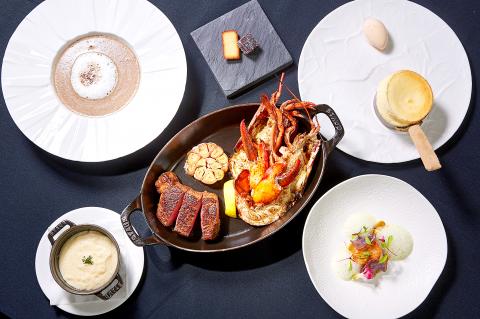Cantonese-style oven-baked crab, scampi panna cotta with lobster jelly and Indian kulfi ice cream infused with red wine and figs — these are just some of the new dishes that Taipei’s most illustrious restaurants have created for Michelin GastroMonth, which starts on Wednesday.
For the second year running, 27 restaurants that hold Michelin stars or are listed in the French taste-maker’s guide will be offering specially curated menus throughout the month of August.
The event incentivizes diners to take the plunge on restaurants they have been eyeing, by offering value-added set menus showcasing the best of each restaurant’s offerings.

Photo courtesy of Ambassador Hotel
Participating restaurants include Cantonese grand dame Le Palais (頤宮), Taipei’s only three-star establishment; Taiwanese innovators Raw, Gen Creative, Le Puting (樂埔町) and Mipon (米香); and Japanese restaurants Shoun RyuGin (祥雲龍吟) and Sushi Ryu (鮨隆).
Priced at NT$1,650, NT$2,750 and NT$4,620, meal tickets remain firmly in the upper range but are going fast, with all tables at Raw and Shoun RyuGin already sold out.
Raw’s first time participating in GastroMonth was always destined to cause a ruckus, given how notoriously difficult it is to get a reservation at the two-star, high-concept establishment. Diners snapped up tickets for dishes like “kokotxas / pil-pil / buckwheat,” a Basque-inspired dish made with the fleshy underpart of a fish’s jaw, and “bittergourd / porridge / granola.”
There remains plenty more to be eaten. Joseph Bistro — a Bib Gourmand selection that specializes in Goan food from India’s western coast — will be serving elegant versions of the subcontinent’s best hits, including the crispy street food pani puri, tandoori prawns and a trifecta of curries.
Italian restaurant Bencotto is offering one of the more intriguing menus, which includes the aforementioned crustacean panna cotta and wagyu with peanuts, fungus and coffee. Carnivores are served by two steakhouses in the form of A Cut and N. 168 Prime, while vegetarians also have two options in the kaiseki-style Yu Shan Ge (鈺善閣) and local fusion at Verde.
The second Michelin Guide to Taipei was released in April this year. 24 establishments received Michelin stars, while another 58 were named in the Bib Gourmand selection for excellent food that is also affordable.

May 18 to May 24 Pastor Yang Hsu’s (楊煦) congregation was shocked upon seeing the land he chose to build his orphanage. It was surrounded by mountains on three sides, and the only way to access it was to cross a river by foot. The soil was poor due to runoff, and large rocks strewn across the plot prevented much from growing. In addition, there was no running water or electricity. But it was all Yang could afford. He and his Indigenous Atayal wife Lin Feng-ying (林鳳英) had already been caring for 24 orphans in their home, and they were in

On May 2, Chinese Nationalist Party (KMT) Chairman Eric Chu (朱立倫), at a meeting in support of Taipei city councilors at party headquarters, compared President William Lai (賴清德) to Hitler. Chu claimed that unlike any other democracy worldwide in history, no other leader was rooting out opposing parties like Lai and the Democratic Progressive Party (DPP). That his statements are wildly inaccurate was not the point. It was a rallying cry, not a history lesson. This was intentional to provoke the international diplomatic community into a response, which was promptly provided. Both the German and Israeli offices issued statements on Facebook

Even by the standards of Ukraine’s International Legion, which comprises volunteers from over 55 countries, Han has an unusual backstory. Born in Taichung, he grew up in Costa Rica — then one of Taiwan’s diplomatic allies — where a relative worked for the embassy. After attending an American international high school in San Jose, Costa Rica’s capital, Han — who prefers to use only his given name for OPSEC (operations security) reasons — moved to the US in his teens. He attended Penn State University before returning to Taiwan to work in the semiconductor industry in Kaohsiung, where he

Australia’s ABC last week published a piece on the recall campaign. The article emphasized the divisions in Taiwanese society and blamed the recall for worsening them. It quotes a supporter of the Taiwan People’s Party (TPP) as saying “I’m 43 years old, born and raised here, and I’ve never seen the country this divided in my entire life.” Apparently, as an adult, she slept through the post-election violence in 2000 and 2004 by the Chinese Nationalist Party (KMT), the veiled coup threats by the military when Chen Shui-bian (陳水扁) became president, the 2006 Red Shirt protests against him ginned up by